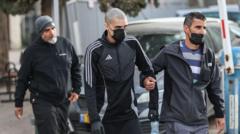Following nearly ten years in an Israeli prison, Ahmed Manasra, who was imprisoned for an attack when he was just 13, has been released, highlighting diverging perspectives on youth incarceration, treatment in custody, and the broader Israeli-Palestinian conflict.
### Release of Palestinian Teen after Nearly a Decade in Israeli Prison Sparks Controversy

### Release of Palestinian Teen after Nearly a Decade in Israeli Prison Sparks Controversy
An 23-year-old Palestinian man, arrested as a minor for a stabbing incident, sees his release amid ongoing debates about juvenile justice and prison conditions.
Ahmed Manasra, a Palestinian man once deemed a symbol of escalating Israeli-Palestinian violence, has recently been released from an Israeli prison after serving a nearly decade-long sentence. Arrested in 2015 at just 13, Manasra’s case has attracted significant attention, igniting debates on juvenile justice and human rights standards in conflict zones.
At the time of the incident, he and his cousin were involved in a stabbing attack in a Jewish settlement in Israeli-annexed East Jerusalem. The attack left two individuals injured, including a 13-year-old boy, while Manasra himself was injured after being hit by a car during the attempted escape. The chilling nature of the event was amplified through graphic footage that circulated widely, prompting a wave of outrage across the Arab world.
Manasra was ultimately convicted of attempted murder and faced a nine-and-a-half-year sentence. Human rights organizations, including Amnesty International, have condemned the treatment he endured while incarcerated. They allege that he experienced "shocking ill-treatment," including prolonged solitary confinement, which reportedly led to severe mental health issues such as schizophrenia.
Manasra’s release has not sufficed to silence the ongoing concerns. His family has opted to withhold public statements, focusing instead on his unknown health status. His lawyer, Khaled Zabarqa, emphasized that the family seeks to prioritize Manasra’s health and well-being, following the traumatic experiences he endured.
Critics, such as the NGO Adalah, argue that Manasra's rights were systematically violated throughout his imprisonment. Concerns include his interrogation protocols—held without legal representation at age 13—and allegations of medical neglect. The Israeli government, on the other hand, maintains that its prison conditions adhere to international law.
Manasra's case highlights broader issues regarding the treatment of Palestinian detainees amid the ongoing Israeli-Palestinian conflict. Recently released prisoners have reported exacerbated conditions in Israeli jails, a situation worsened by heightened tensions following conflicts in Gaza.
Moreover, incidents like the recent death of a Palestinian minor in detention serve as stark reminders of the precarious nature of youth detention in this conflict. The fallout from these events continues to resonate, igniting intense discourse around human rights, educational access, and health care provisions within the Israeli prison system.
As the international community reflects on the implications of such cases, both Palestinian and Israeli perspectives reveal a complex and deeply rooted struggle that continues to evolve in the context of a protracted conflict.



















